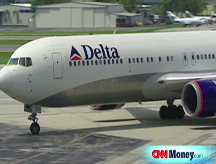Air passengers' No. 1 complaint: Service
Fliers more upset about cutbacks than high airfares and additional fees in study.
NEW YORK (CNNMoney.com) -- Deteriorating airline customer service has helped drive flier satisfaction to its lowest level in three years, according to a study released Tuesday, and for many it has become an even bigger concern than higher airfares and additional fees.
Poor airline customer service was the leading factor in a decline in customer satisfaction this year, according to the 2008 North American Airline Satisfaction Study from the consumer research group J.D. Power and Associates .
The study found that customer dissatisfaction with the helpfulness and courtesy of flight staff, gate agents and crew was twice as large as dissatisfaction with pricing.
"Passengers are being affected by the ramifications of carriers making staff cutbacks, and have expressed that performance and attitudes of airline staff are suffering," said Sam Thanawalla, director of the global hospitality and travel practice at J.D. Power in a statement.
The study measured customer satisfaction levels for traditional and low-cost airlines in seven areas: cost, crew, in-flight services, aircraft, check-in, the boarding deplaning and baggage claim processes, and the reservation and check-in process.
For the third year in a row, low-cost carrier JetBlue (JBLU) ranked the highest overall, scoring well in six out of seven of the categories, while Continental Airlines (CAL, Fortune 500) and Alaska Airlines (ALK) tied for first among traditional carriers. Continental continued a three-year streak among the old-line airlines.
Only Alaska Airlines and Air Canada saw their customer satisfaction scores increase. All others saw scores decline.
Many of the airlines allow customers to check in online or with airport kiosks to speed up the check-in and boarding process, and cut staffing costs. Alaska Airlines, a major carrier along the West Coast, has relied heavily on kiosks, as well as an automated baggage drop as part of a patented system called "Airport of the Future."
"It allows our customer service agents to handle twice the amount of customers than we usually would," said Paul McElroy, spokesman for Alaska Airlines.
The J.D. Power study found that more passengers were booking their flights online in 2008 than in 2007. Older passengers were more likely to prefer complementary meals, while younger ones preferred in-flight movies. And customers were increasingly likely to choose an airline based on its rewards program. ![]()


